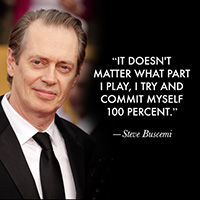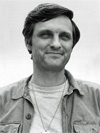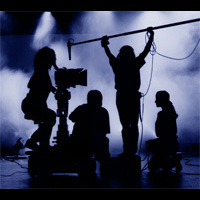 Spread the word!!!
Spread the word!!!
Read more about CiAO on the About Us page.
 (a short treatise on acting, especially in independent films, written for CiAO
by Popeye Theophilus Barrnumb – Writer/Director/Producer/Actor)
(a short treatise on acting, especially in independent films, written for CiAO
by Popeye Theophilus Barrnumb – Writer/Director/Producer/Actor)
You are an Actor!
Independent filmmakers hear, "But, I'm not an actor...", all the time when they are talking to people about being actors in their films. However, the person making the above statement is incorrect.
We are all actors.
We all act differently when we are...
• at home – compared to at school or work;
• around our family – compared to our relatives, friends, co-workers, classmates, or strangers;
• in private – compared to in public
• ...and so on...
All of us wear many masks and many hats, every day, all day long. (a little, or a lot)
 • Types of Actors — Indie and Otherwise
• Types of Actors — Indie and Otherwise
(and local 'non-actors')
Most (all) of us use our 'acting abilities and talents' in our everyday lives. Some may use their skills more than others. (like teachers, sales people, politicians, etc.) Some excel at it. Other simply do the best they can, and that is usually better than good enough. Some perform as a hobby (community theater, etc.), others as a job ("real" actors).
Many actors go to school to become professional actors, but not all actors have taken that route. And some of those 'rogue actors' have become very famous and/or successful. Some actors start out 'learning on the job' and then go from there, which may or may not involve future school or instruction. Some (most) actors start out in very small roles, and then work their way up to larger, or starring roles. Or parlay an "indie film career" into doing professional acting, local TV commercials, etc... Sometimes people "act" just because it's different, fun, new, and/or exciting.
But, we are all actors.
You are an Actor!
• The Show Business 'Acting Racket'
In a clip from the October 7, 2013 Late Night with David Letterman show, Actor/Director Tom Hanks describes the "Show Business Racket" about actors and acting. He is talking about the "non-actors" who played the Somali Pirates in his movie, "Captain Phillips". (this has been done many times, in many hollywood films, sometimes with great success)
 • Non-actor Barkhad Abdi was nominated for and has won an 86th Academy Awards Oscar for Best Supporting Actor
for his role in "Captain Phillips" (2013). He was working as a chauffeur when he was cast in
the film. He had no previous acting experience or any aspirations to become an actor.
• Non-actor Barkhad Abdi was nominated for and has won an 86th Academy Awards Oscar for Best Supporting Actor
for his role in "Captain Phillips" (2013). He was working as a chauffeur when he was cast in
the film. He had no previous acting experience or any aspirations to become an actor.
 (note: some people question whether this is a 'valid' situation, being nominated for an Oscar
having had no previous experience in acting, but that is a separate issue —
however, this is one of many similar examples that "prove our point(s)")
(note: some people question whether this is a 'valid' situation, being nominated for an Oscar
having had no previous experience in acting, but that is a separate issue —
however, this is one of many similar examples that "prove our point(s)")
Also see the announcement to the right, as well, which is fairly common – for the film "The Falling".
 • Another interesting case is actor Alan Alda. (one among many similar, actually) With
the exception of taking a course in Theater Games, he's never studied acting. His degree from
Fordham University is in Science. He felt that he was a natural performer and that studying would
ruin his gift for being natural. And the rest, as they say, is history.
• Another interesting case is actor Alan Alda. (one among many similar, actually) With
the exception of taking a course in Theater Games, he's never studied acting. His degree from
Fordham University is in Science. He felt that he was a natural performer and that studying would
ruin his gift for being natural. And the rest, as they say, is history.
• To wit: As an indie actor, you will most likely not be doing "Shakespeare", or be asked to "cry on demand", or stretch your personal abilities and talents too far. This makes it possible to perform to at least a reasonably acceptable level, if not better than that with a little help from the filmmakers and some work and commitment on the "non-actor's" part.
• Acting Secrets?
Here's an (indie) Acting Secret: Most actors "play themselves in the role", and then tweak their performance as needed, and requested. And everyone can (and does, already) do that. (many "moviestars" do this, and 'discovered' first-time actors, and celebrities, models and singers and other performers who get into acting)
(There has been some comment that the above, and the rest of "this", is 'our opinion' – so be it and whatever (that should actually be self-evident and not need pointing out) — however, this information is probably more true than not, especially for "non-actors" — an argument could be made that it is less true for "professional actors" — beyond the above, there are schools, and classes, and different acting methods, like so-called Method acting, Classical acting, Stanislavski's system, the Meisner method, and others — see descriptions and more information at the Acting pages at Wikipedia —— and then there is this quote by actress Susan Strasberg, daughter of famed acting teacher Lee Strasberg: "There's no such thing as The Method. The term "method-acting" is so much nonsense. There are many methods, many techniques. My father merely used a method of teaching based on the ideas originally propounded by Konstantin Stanislavski -- self-discipline, how to think out a role and use imagination. That's all." —— and: "Acting is the most minor of gifts and not a very high-class way to earn a living. After all, Shirley Temple could do it at the age of four." — Katharine Hepburn)
In a very-small-budget indie film, if the role is particularly 'difficult', then an actor with more ability, talent, and/or experience will probably be cast — that may, or may not, be you. Sometimes we don't even know that we are good at something until we try it. Sometimes we don't know that we like, or love, something until we try it.
Being in an Independent Film production, whatever your contribution, can be fun, interesting, and exciting.
 • The Magic of Filmmaking
• The Magic of Filmmaking
These forays into filmmaking rarely pay any money. (it's almost always volunteer – and then you (usually) pay for your own gas and food) You will find that most of the films, especially short films, are nano-budget productions, done by hobbyists, wanna-be filmmakers, beginners, amateurs, etc. So most (usually all) of the people working on the film, actors and others, are not professionals, or even semi-pros... they are like you. Most of the people working in local indie productions do it for the love of film and filmmaking. Some do it for experience. Some for the experience. Some because they simply must.
Not to scare you away, but it is WORK, and sometimes work is... work. So at times it can be tiring, tedious, boring, irritating, frustrating, etc. Or just plain a lot of hard work. There is a lot of "hurry up and wait" while the camera is being readied for the next shot, or technical details are being worked out. There are usually no real facilities for the actors, or the crew. (so no trailers, and you're lucky if there is "craft services" (food, snacks, & drink), or a chair to sit down, etc.)
And sometimes the weather or conditions will be hot, cold, raining, uncomfortable, and so on. But hopefully the good times will far-outweigh the 'bad'. And, because it is "work" (even if you are not being paid), it is important to conduct yourself professionally, like you would in any work environment. (as an actor, that means knowing your lines and being ready to go when called "on set"; and similarly for all others)
Note that, because people who do indie filmmaking do it "on the side", "as a hobby", and in their own voluminous free time, the times for working on these films are often on the weekends and evenings, after people's "day jobs" are completed. But people's schedules are worked around as needed. This is something to keep in mind and make sure clear communication is accomplished so everyone knows where everyone is at with their schedules and availability.
• Other Reasons Why People Make Indie Films
Maybe you particularly love zombie or horror films, and you think it would be fun to be in one. Maybe you would like to have something to show your friends, family, or future family some day. Regardless of the reason(s) why you might like to act in an indie film, you will most-likely enjoy the experience, meet some new and interesting people, learn some new things, especially about the "magic of filmmaking", and you might even find out that you really like some specific part of filmmaking, like directing, screenwriting, makeup and/or special effects, continuity, or any number of other jobs on a film set, or in pre-production or post-production.
• I know, let's put on a show!
Local, indie filmmakers tend to have a difficult time finding actors. And others to help work on their films. So if you think you might like to get involved and help out, please do! Your contribution, whatever it is, will be appreciated and acknowledged. And sometimes that is better than being paid hard cash money.
 • A note to (indie) Directors, Casting Directors, and Acting Coaches
• A note to (indie) Directors, Casting Directors, and Acting Coaches
Working with beginner, amateur, inexperienced, non-professional, and theater, actors (and "non-actors"), does put a certain onus on the Director, Casting Director, and/or Acting Coach, to make sure they choose someone who can perform the role in question, as well as be able to be coached to do what needs to be done.
Part of the problem we see too much of the time is that that is usually not done (at all), and/or it is done insufficiently, and/or improperly. So we "get what we get". Or, we end up using the same actors in every film, because that's all there is, or all we have access to, or all we think there is available to us.
And even if we do get "another (new) actor" (or even a 'new' community-based actor), there is a lot of "settling" for someone who too-often just isn't good enough, and/or they are not quite right for the role, and/or they are not properly coached, so it too-negatively affects the film, etc. And even our "good actors" could use some good coaching (and direction) to perfect their performance most of the time, that they usually do not get. So it lets them down, and the production down, etc...
We therefore implore all of us to do better in this regard. It can only help to make our films better, which is something we all want and desire.
So please take an active role in attempting to better this area of (local) indie filmmaking, by trying harder, being actively aware of the issue(s), doing more rehearsals (somewhere between what a 'real' film might do and a theater production), having a person on set whose job it is to keep an eye on this aspect of the film, and to make a preemptive strike and take pro-active attitudes and behaviors in pre-production.
Good luck! (but, ideally, let's take 'luck' out of the equation as much as humanly possible)
 • Working with "non-actors"
• Working with "non-actors"
We must also remember with whom we're dealing while working with "non-actors". We have often felt it would be a good idea to use something like, "Lights. Camera. In-Character. Action." when directing them (or a similar modern-day indie equivalent), just to give them an audio cue to remind them that it's time to "get into character". Psychologically, that would probably be a very helpful thing for them.
We should discuss some basic concepts with them, as in-depth as possible, like the following list. This probably cannot be over-emphasized. The more tools that we can give them, the better off they will be, the better their performance will be, and the better the film will be. These people really need coaching, so a formal or informal "Acting Coach" is probably a really good idea.
- Being in the moment
- Being fearless
- Staying in character until they hear the direction "cut" (that is, 'keep playing/pretending' — sometimes wonderful, unexpected gems can occur)
- Getting to a position of being "off-book" (memorizing lines)
- Enunciation
- Speaking and movement speed (often, or usually, slower rather than faster)
- Acting with intent, "on purpose", and self-immersion
- Playing yourself in the role (with appropriate tweaking)
- Transformation of self
- Believability and being "real"
- Truth of character and situation, credible behavior in believable circumstances
- Non-verbal and visual clues and cues (playing off of each other)
- Acting teacher Sanford Meisner once said, "An ounce of emotion is worth a pound of words."
- Character to character and group (ensemble) "good chemistry"
- Responsive interaction with other actors ("communication")
- Storytelling and "pretending"
- Dedication, discipline, and professionalism
- Backgrounding a character
- Becoming a character
- Naturalness of style (speaking, acting, emotion, movement) and lifelike performances
- Use of careful observation, self-knowledge, imagination, and emotion, as the cornerstones of the craft (real-life and imagined experiences)
- Emotion memory and truthful emotions (sensory, psychological, emotional recall)
- The essence of acting is a search for truth, and realistically portraying that truth in a seemingly seemless and natural manner
We should be particularly aware that these "non-actors" are not familiar with auditions and the audition process. (as it is generally / usually performed) Therefore, special care should be taken when auditioning people who are not professional, or experienced, actors. "Sink or Swim" might be a way to go, but perhaps not the best way. And do not forget that it is the "Casting Director" (Director, Producers, whomever) who must work at attempting to perceive beyond what is being presented so as to make a good choice, and not miss out on a potentially good prospect. Some people will naturally be better at this than others. So seek help when you can.
The following clip from the 1963 film "Bye Bye Birdie" starring Ann-Margret is a perfect example of how to throw yourself into role, give it your all and then some, and commit to it 110%. It is a good learning tool to show people what they can and should attempt.
Here is another clip, from the TV show "Sanctuary" where actor Robin Dunne performs a dance to the Hindu goddess Kali. Rather than coming across as corny or hoakey, because the actor was fearless and committed himself to the role 110%, it is instead an awesome display.
Please JOIN the CiAO facebook page:
![]() CiAO Facebook Fan Page
CiAO Facebook Fan Page
Also, please sign up to our e-mail list by sending an e-mail to
MemberMe CiAOiFilm.net
CiAOiFilm.net
requesting to be added to our mailing list. We currently send out a bi-weekly(-ish)
e-newsletter (indieOpolis) and occasional important announcements.
(CiAO Alerts!)

Indie Film
Digital Video
Feature Film
Documentary
Television
Theater
Animation
Multimedia
Videos and DVD's
Filmmakers
Producers
Directors
Writers
Cinematographers
D.P.'s
Art Directors
Actors
Voice Actors
Makeup
Costumes
Special Effects
Designers
Artists
Storyboards
Set Designers
Photographers
Sound
Lighting
Crew
Pros
Amateurs
Beginners
Dreamers
Wanna Be's
Hope to Be's
Interns
Students
Others
Anyone
&
Everyone